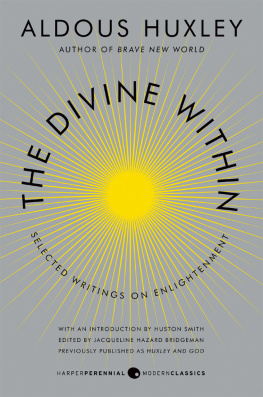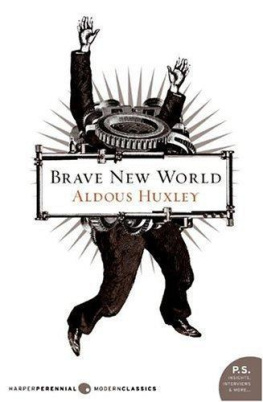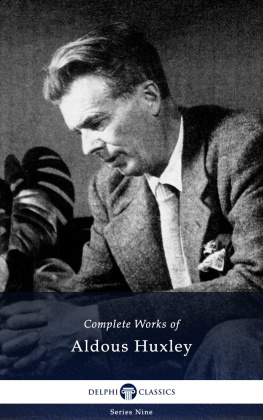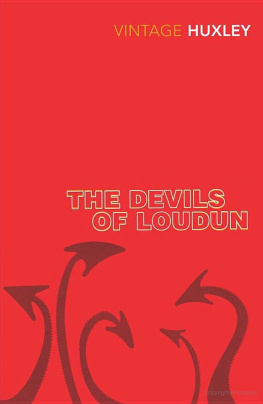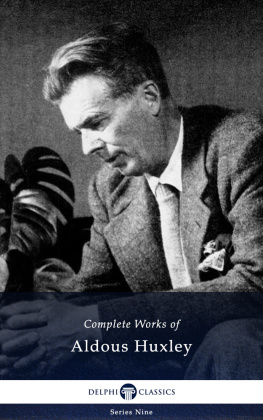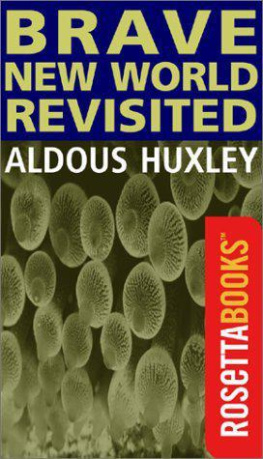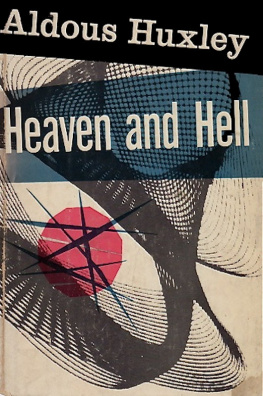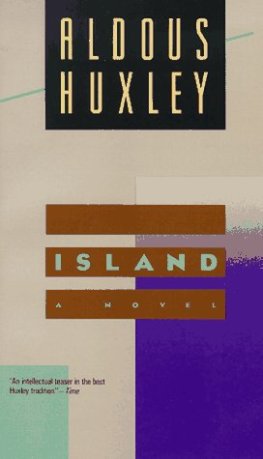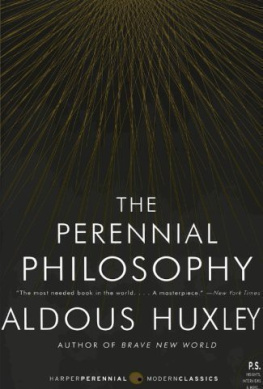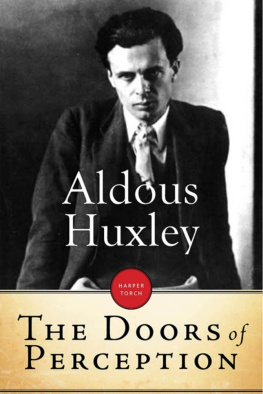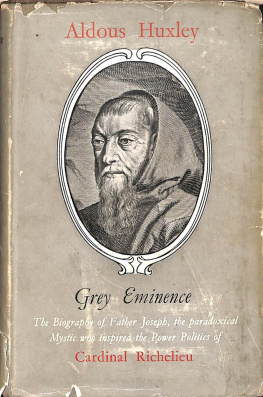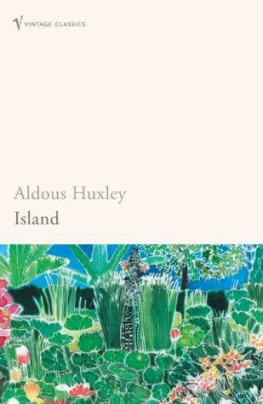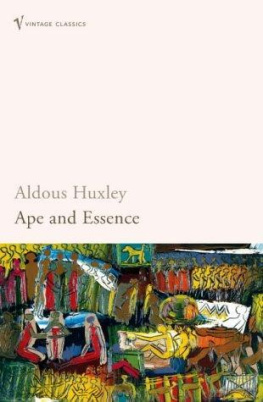CONTENTS
O fficially an agnostic, Aldous Huxley was to declare in 1926, but [he demurred] when in propitious emotional circumstances with certain landscapes, works of art,... certain people, I know that Gods in His heaven and alls right with the world.
The above passage, from an essay written when the author was thirty years old, clearly shows that he entertained ambivalent feelings about religion and God. The intuitive versus the rational. Huxleys mystic germ, as William James called his own inner voice, apparent here, lay dormant for many years.
In his novels and essays of the 1920s, Huxley was scathingly skeptical of religion and its life-retreating pious aspirants. His gods were life, love, sex. Religion that negated this trilogy, he scorned. He abhorred the views of Swift, Pascal, Beaudelaire, Proust, and even St. Francis of Assisi! According to Huxley, they were life-haters.
Huxleys earliest mentors were the passionate life-affirmersRobert Burns, D. H. Lawrence, and William Blake. In his words, he was a life-worshipper. His God was the God of Life. He believed in the diversity of the human persona; all desires served but tempered by reason. The moderation that Aristotle preached. The philosophy of the Golden Mean. It was, as Huxley wrote, a matter of the equilibrium of balanced excesses. As with the Greeks he advocated the worship of many godscelebrating all aspects of human life. One could live with this celebration of excesses, as he called it, by using discrimination and balance and simply good manners; an impossibly fragile concept for all but the intellectual and moral nobility of persons such as Huxley himself.
Over the next twenty years, his hedonistic attitude began to recede, and his mystic germ began to mature. Pluralism gave way to monism as seen in The Perennial Philosophy (1944), a documentation of the common doctrine in all major religions: that the truth is universal, that God is One.
By the 1940s Aldous Huxley was labeled a mystic. It is an accurate description if one understands mysticism as William Blake defines it, The self at one with God, and by Plotinuss description of spiritual ecstasy, The flight of the alone to the Alone.
Mysticism is often understood by bad poets to mean the mysterious and by sophistic savants as humans becoming God. The words literal definition is intimate union of the soul with God through contemplation and love.
The pronouncement that Aldous Huxley unabashedly believed in God may startle the current generation of young people charmed by Brave New World (1932), which has been a favorite with the fiercely dedicated college agnostics who never bothered to read any of the authors later novels.
That Aldous Huxley intuitively knew the reality of Godor The Divine Ground of Our Being or J. D. Salingers Fat Lady or George Lucass The Force or Bill Wilsons Higher Power or Emersons Divine Sparkis beautifully expressed in these essays.
Originally printed in the bi-monthly magazine Vedanta and the West between the years of 1941 to 1960, the essays are here published in book form for the first time. Vedanta and the West, now extinct, was published by the Vedanta Society of Southern California from 1941 to 1970 with a modest circulation of under a thousand subscribers. Its celebrated array of editors were Aldous Huxley, Christopher Isherwood, John Van Druten, Gerald Heard, and Swami Prabhavananda, who headed the organization. Among the magazines illustrious contributors were the likes of Indias Nehru, Rabbi Asher Block, U Thant, Somerset Maugham, Arnold Toynebee, Vincent Sheean, Tagore, Alan Watts, and Dr. Joseph Kaplan, chairman of the physics department at UCLA.
In the twenty years that the author was associated with the Vedanta Center, he contributed over forty articles to the magazine. We have chosen the more representative of this output. These essays are new to the general reading public. For thirty years they lay lost in the files of the Vedanta Society. A few of the articles eventually became portions of the novels Huxley was writing at the time, most importantly Time Must Have a Stop (1945), Huxleys own favorite work.
Huxley remained a devotee of Prabhavananda, a monk of the highly respected Ramakrishna Order of India, and during this period was eventually initiated by him. But there came a rift between guru and disciple when the author began experimenting with mescaline and LSD as tools toward enlightenment. Prabhavananda was adamantly opposed to the use of drugs, and drugs used as a short cut to spiritual awareness. Huxleys guru claimed that drugs were a deterrent to spiritual growthif you were a fool when you entered the drug-induced visionary state, you remained a fool when you returned to normal consciousness. Whereas a genuine spiritual experience would leave one transformed and enlightened as witnessed in the lives of the great saints and spiritual geniuses.
Eventually, Huxley was drawn to Krishnamurti, who espoused freedom from any prophet or path and was closer to Zen than Vedanta.
Even though he drifted away from the Vedanta Society, Huxley continued to supply the magazine with essays. His admiration for Swami Prabhavananda never wavered. He delivered his last lecture, titled Symbol and Immediate Experience, in 1960, three years before his death.
Jacqueline Hazard Bridgeman
F rom the time that I first met Aldous Huxley when I was twenty-eight until he died seventeen years later, he was important to me not only as a writer but as a friend and mentor. So before I proceed to the main object of this introduction, which is to situate the essays of this book in the context of Huxleys literary career, I shall insert a memorial that, on the twenty-fifth anniversary of Huxleys death, I wrote for the Los Angeles Times.
T here was a moment in the 1950s when there was talk of pooling the talents of Aldous Huxley, Igor Stravinsky, and Martha Graham to turn The Tibetan Book of the Dead into a ballet with Greek chorus.
That moment passed, but when Aldous Huxley died a quarter-century ago this week, it was the words of that Tibetan manual that were read into his ear by his prior request: Now there is approaching that clear white light of the Void. Do not be afraid. Do not be afraid. It is your friend. Go fearlessly into that Light of the Void (abridged).
It was likewise of the Void that Huxley spoke most during my first meeting with him in 1947. He and his wife, Maria, were at their cabin hide-away in the Mojave Desert, and Aldous took me for a long walk through its scrubby stretches.
He loved the desert, he told me, for its symbolic power. Its emptiness emptied his mind. The boundlessness of its sands [I paraphrase] spreads a mantle of samenesshence unityover the worlds multiplicity in the way snow does. The Nothingness to which the Desert Fathers were drawn is not a blank negation. It is a no-thing-ness in which everything is so interfused that divisions are transcended. Pure light contains all the frequencies of the rainbow, but undemarcated. The Void is the vacuum-plenum complex, grasped by its vacuum pole.
Years later, when I helped to bring Huxley to the Massachusetts Institute of Technology for the 1960 fall semester, the audience for his public lectures grew until by midpoint in the series the Boston Police Department had to augment its force on Wednesday evenings to manage traffic that backed up from Cambridge across the Charles River. When I alluded to this as a tribute, Huxley characteristically disclaimed it. Its because Ive been around so long, he said. Ive become like Anne Hathaways Cottage. If I lived to be a hundred I shall be like Stonehenge.
He didnt live to be a hundred, and when he died, at the age of sixty-nine, the world lost an exceptionally creative intelligence. Most obviously, it lost an encyclopedic mind. When a leading newspaper decided that the Fourteenth Edition of the Encyclopedia Britannica should be brought under review, no one was surprised when Huxley was asked to do the job. (He found it inferior to the Eleventh Edition.)

